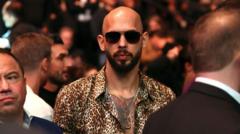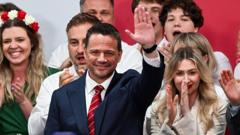Romania's presidential race is heating up, featuring George Simion, a nationalist candidate who has already won the first vote, and Nicusor Dan, a liberal incumbent. Public sentiment reflects deep divisions, with many voters expressing frustration over traditional politics and a rising tendency towards nationalism, risking Romania's alignment with European Union policies.
Romania on the Brink: The Polarizing Presidential Election Between Euro-Skepticism and Liberalism

Romania on the Brink: The Polarizing Presidential Election Between Euro-Skepticism and Liberalism
The upcoming Romanian presidential election pits far-right nationalist George Simion against pro-European liberal Nicusor Dan, raising concerns over the country’s future position within the European mainstream.
With the re-emergence of Romania's presidential elections, the political landscape is marked by tension and uncertainty. Following the annulment of last year's elections due to allegations of Russian interference, the role of far-right politics has come to the forefront once more. George Simion, a former football casual and nationalist politician, is now in a tight race against liberal candidate Nicusor Dan, the current mayor of Bucharest, after winning the initial round by a considerable margin.
Simion’s campaign has resonated with a significant portion of voters, especially in Teleorman County, one of Romania's economically disadvantaged areas, where he garnered 57% of the votes in the first round. Labeled an “anti-system” candidate, his support reflects a national discontent with established political norms and frustrations over persistent corruption. This sentiment is a culmination of disillusionment following decades of political control by the same parties.
Dan advocates for Romania's collaboration within the EU, countering Simion's isolationist rhetoric, which emphasizes putting Romania’s interests first. However, the election dynamics reveal a divided electorate, each with contrasting visions for Romania's future.
In a testament to the polarized views, voters have expressed their opinions through grassroots movements across the country. Some support Simion's promises of job creation and national pride, while others, such as Roxana, a factory owner, fear the potential backlash against Romania's reputation within Europe should Simion, known for his combative rhetoric, succeed. Concerns over stability and economic relations loom large as Roxana and her associates push for Dan’s pro-European Union stance.
Simion has garnered attention not only for his nationalistic views but also for his controversial statements, including insults directed at political figures and even threats against political opponents. His campaign is viewed ambiguously; while he projects a desire for reform and a break from the status quo, critics categorize his approach as harmful and detrimental to Romania's international representation.
As the second round approaches, polling remains tight, indicating a nation at a crossroads. With implications for Romania's foreign relations and political future, the results of this election could redefine the country’s direction, placing it in a delicate balance between Euro-skepticism and commitments to the European mainstream. The outcome will determine not only the presidency but potentially the very foundation of Romanian democracy and its relationship with Europe.























